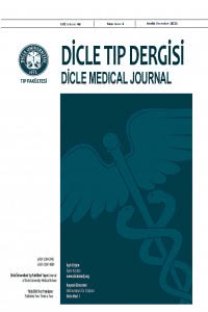Solid Organ Transplantasyonu Sonrası Post-Transplant Lenfoproliferatif Hastalıklar: Tek Merkez Deneyimi
Post-Transplant Lymphoproliferative Diseases After Solid Organ Transplantation: Single Center Experience
___
- 1. Adami J, Gäbel H, Lindelöf B, et al. Cancer risk following organ transplantation: a nationwide cohort study in Sweden. Br J Cancer 2003; 89: 1221.
- 2. Petrara MR, Giunco S, Serraino D, Dolcetti R, De Rossi A. Post-transplant lymphoproliferative disorders: from epidemiology to pathogenesis-driven treatment. Cancer Lett 2015; 369: 37-44.
- 3. Ibrahim HA, Naresh KN. Posttransplant lymphoproliferative disorders. Adv Hematol 2012; 2012: 230173.
- 4. Opelz G, Naujokat C, Daniel V, Terness P, Döhler B. Disassociation between risk of graft loss and risk of non-Hodgkin lymphoma with induction agents in renal transplant recipients. Transplantation 2006; 81: 1227.
- 5. Shahinian VB, Muirhead N, Jevnikar AM, et al. EpsteinBarr virus seronegativity is a risk factor for late-onset posttransplant lymphoroliferative disorder in adult renal allograft recipients. Transplantation 2003; 75: 851.
- 6. Zangwill SD, Hsu DT, Kichuk MR, et all. Incidence and outcome of primary Epstein-Barr virus infection and lymphoproliferative disease in pediatric heart transplant recipients. J Heart Lung Transplant 1998; 17: 1161.
- 7. Swerdlow SH, Campo E, Harris NL, et al. (Eds): WHO Classification of Tumours of Haematopoietic and Lymphoid Tissues (Revised 4th edition). lARC: Lyon 2017, p.453- 462.
- 8. Tsai DE, Hardy CL, Tomaszewski JE, et al. Reduction in immunosuppression as initial therapy for posttransplant lymphoproliferative disorder: analysis of prognostic variables and long-term follow-up of 42 adult patients. Transplantation 2001; 71: 1076.
- 9. Trappe R, Oertel S, Leblond V, et al. Sequential treatment with rituximab followed by CHOP chemotherapy in adult B-cell post-transplant lymphoproliferative disorder (PTLD): the prospective international multicentre phase 2 PTLD-1 trial. Lancet Oncol 2012; 13: 196-206.
- 10. Jagadeesh D, Woda BA, Draper J, Evens AM. Post transplant lymphoproliferative disorders: risk, classification, and therapeutic recommendations. Curr Treat Options Oncol 2012; 13: 122.
- 11. Evens AM, David KA, Helenowski I, et al. Multicenter analysis of 80 solid organ transplantation recipients with post-transplantation lymphoproliferative disease: outcomes and prognostic factors in the modern era. J Clin Oncol 2010; 20; 28: 1038-46.
- 12. Dierickx D, Tousseyn T, Sagaert X, et al. Single-center analysis of biopsy-confirmed posttransplant lymphoproliferative disorder: incidence, clinicopathological characteristics and prognostic factors. Leuk Lymphoma 2013; 54: 2433-40.
- 13. Kinch A, Baecklund E, Backlin C, et al. A populationbased study of 135 lymphomas after solid organ transplantation: The role of Epstein-Barr virus, hepatitis C and diffuse large B-cell lymphoma subtype in clinical presentation and survival. Acta Oncol 2014; 53: 669-79.
- 14. Ready E, Chernushkin K, Partovi N, et al. Posttransplant Lymphoproliferative Disorder in Adults Receiving Kidney Transplantation in British Columbia: A Retrospective Cohort Analysis. Can J Kidney Health Dis 2018; 1: 5: 1–12.
- 15. Cheson BD, Fisher RI, Barrington SF, et al. Recommendations for initial evaluation, staging, and response assessment of Hodgkin and non-Hodgkin lymphoma: The Lugano classification. J Clin Oncol 2014; 32: 3059-67.
- 16. Morton M, Coupes B, Roberts SA, et al. Epidemiology of posttransplantation lymphoproliferative disorder in adult renal transplant recipients. Transplantation 2013; 15: 95: 470-8.
- 17. Ishihara H, Shimizu T, Unagami K, et al. PostTransplant Lymphoproliferative Disorder in Kidney Transplant Recipients: A Single-Center Experience in Japan. Ther Apher Dial 2016; 20: 165-73.
- 18. Caillard S, Lelong C, Pessione F, Moulin B; French PTLD Working Group. Post-transplant lymphoproliferative disorders occurring after renal transplantation in adults: report of 230 cases from the French Registry. Am J Transplant 2006; 6: 2735-42.
- 19. Trofe J, Buell JF, Beebe TM, et al. Analysis of factors that influence survival with post-transplant lymphoproliferative disorder in renal transplant recipients: the Israel Penn International Transplant Tumor Registry experience. Am J Transplant 2005; 5: 775–80.
- 20. Cavaliere R, Petroni G, Lopes MB, Schiff D; International Primary Central Nervous System Lymphoma Collaborative Group. Primary central nervous system post-transplantation lymphoproliferative disorder: an International Primary Central Nervous System Lymphoma Collaborative Group Report. Cancer 2010; 15: 116: 863-70.
- 21. Dierickx D, Tousseyn T, Sagaert X, et al. Single-center analysis of biopsy-confirmed posttransplant lymphoproliferative disorder: incidence, clinicopathological characteristics and prognostic factors. Leuk Lymphoma 2013; 54: 2433-40.
- 22. Trappe R, Oertel S, Leblond V, et al. Sequential treatment with rituximab followed by CHOP chemotherapy in adult B-cell post-transplant lymphoproliferative disorder (PTLD): the prospective international multicentre phase 2 PTLD-1 trial. Lancet Oncol 2012; 13: 196-206.
- 23. Jain A, Nalesnik M, Reyes J, et al. Posttransplant lymphoproliferative disorders in liver transplantation: a 20-year experience. Ann Surg 2002; 236: 429-37.
- ISSN: 1300-2945
- Yayın Aralığı: 4
- Başlangıç: 1963
- Yayıncı: Cahfer GÜLOĞLU
İki Olguda Safra Kesesi Duplikasyonu
Hatice Sonay YALÇIN CÖMERT, Sefa SAĞ, Mustafa İMAMOĞLU
Fatih AKSOY, İsmail Barkın IŞIK, Hasan Aydın BAŞ, Ali BAĞCI, Fatih KAHRAMAN, Yunus Emre OKUDAN, Mevlüt Serdar KUYUMCU, Ahmet ALTINBAŞ
Meme Kanserinde Brca-1 ve Brca-2’de Sık Görülen Polimorfizm Mutasyonların Bölgemizde Varlığı
MUSTAFA ZANYAR AKKUZU, Mehmet KÜÇÜKÖNER, Sevgi İRTEGUN, Nadiye AKDENİZ, Zuhat URAKÇI, MUHAMMET ALİ KAPLAN, HÜSEYİN BÜYÜKBAYRAM, Abdurrahman IŞIKDOĞAN
Gönül Zişan ŞAHİN, Nergiz HÜSEYİNOĞLU, Hatice KÖSE ÖZLECE
Mesane kanserinde klinik ve patolojik özelliklerin önemi ve hastalık seyrine etkisi
Etkin Eğitim Müdahalesi HIV Hastalarında Uyumu İlaç Pozolojisinden Bağımsız Olarak Etkiler mi?
İREM AKDEMİR KALKAN, Ömer KARAŞAHİN, Tuba DAL, MERYEM MERVE ÖREN, Merve AYHAN, YAKUP DEMİR, Yeşim YILDIZ, FESİH AKTAR, MUSTAFA KEMAL ÇELEN
MUHAMMET ASENA, Adem CANAN, ÜNAL ÖZTÜRK, PINAR AYDIN ÖZTÜRK, AYFER GÖZÜ PİRİNÇÇİOĞLU
Probable Interaction of MMP-2 and VEGF in Testicular Deteriorations Related to Aging
Servet KIZILDAĞ, Ferda HOSGORLER, Başar KOÇ, Özgür GÖLGELİOĞLU, Güven GÜVENDİ, Sevim KANDİŞ, Mehmet ATEŞ, Nazan UYSAL
Servikal Kanser Hastalarinin Uzun Dönem Sonuçlari: Doğu Anadolu Tek Merkez Deneyimi
Cem MİRİLİ, Ali YILMAZ, Mehmet BİLİCİ, Salim BASOL TEKİN
Eren Arslan DAVULCU, Hale BÜlBÜL, Yusuf ULUSOY, Nur Akad SOYER, DERYA DEMİR, NAZAN ÖZSAN, GÜNEŞ AK, Fahri ŞAHİN, Mahmut TÖBÜ, MURAT TOMBULOĞLU, Filiz VURAL, Güray SAYDAM
